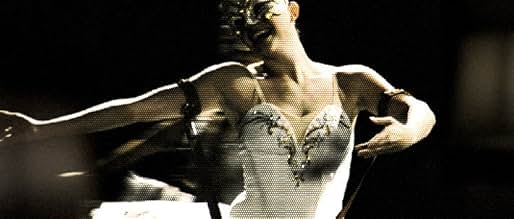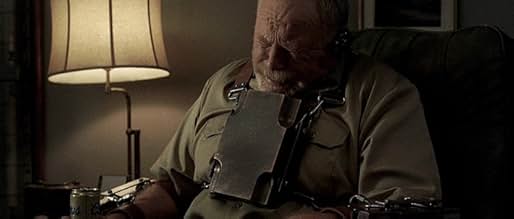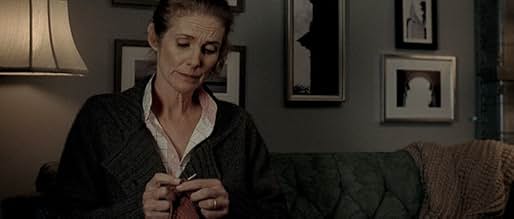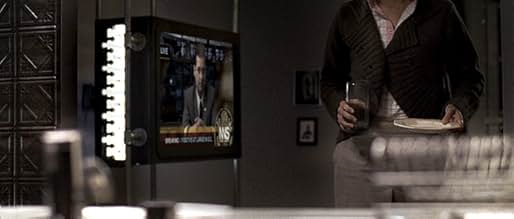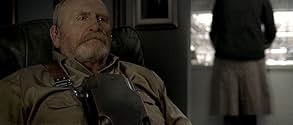Añade un argumento en tu idiomaA short film adaptation of Kurt Vonnegut's Harrison Bergeron, 2081 depicts a dystopian future in which, thanks to the 212th Amendment to the Constitution and the unceasing vigilance of the U... Leer todoA short film adaptation of Kurt Vonnegut's Harrison Bergeron, 2081 depicts a dystopian future in which, thanks to the 212th Amendment to the Constitution and the unceasing vigilance of the United States Handicapper General, everyone is "finally equal...." The strong wear weights,... Leer todoA short film adaptation of Kurt Vonnegut's Harrison Bergeron, 2081 depicts a dystopian future in which, thanks to the 212th Amendment to the Constitution and the unceasing vigilance of the United States Handicapper General, everyone is "finally equal...." The strong wear weights, the beautiful wear masks and the intelligent wear earpieces that fire off loud noises to ... Leer todo
- Dirección
- Guión
- Reparto principal
- Lead HG Man
- (as James Burns)
- 'Prima' Ballerina
- (as Becky King)
- Additional Ballerina
- (as Chelsea Hacket)
Reseñas destacadas
Harrison Bergeron, the film, might be hard to find - do yourself a favor - and find it!
As such, we find ourselves observing a couple: the wife is the mindless religious type, who never ponders on anything that may make her uncomfortable; never questions anything, let alone challenge authority; and who does not require any handicap as she is considered the standard of normalcy. Her husband, on the other hand, is heavily handicapped, and, via various cinematic techniques in conjunction with technical handicapping mechanisms, we are shown how these handicaps manifest themselves for the affected individual. In the case of the man we are observing, they seem to interrupt his reflections on past memories that the Handicapper General feels could lead to acts of dissent.
We find out more of what these memories are about when a "Breaking News" story interrupts the program he is watching to announce that "suspected Anarchist" Harrison Bergeron has escaped from custody. Arrested several years ago, Bergeron was charged with "propagandous vandalism, broadcast piracy, refusal to report for his handicapping evaluations, and blatant removal of his handicaps in a public place." The newscaster continues by stating that he is," an athlete and genius. Is extremely under-handicapped and considered to be dangerous."
When the regularly scheduled program returns, something is not right. Immediately the man whose room we are watching from whispers, "Harrison". Suddenly, a mech-Jesus-esque man that looks like he just escaped from a mental institution, but was unable to fully remove all the restraint mechanisms, takes over the stage, announcing that "there is a bomb in the theatre, and the detonator is in my hand". It's Bergeron; "the greatest man you've never known", and with a sense of utopian pride he rips off his handicaps after having orated a moving soliloquy meant to inspire the masses into throwing off their handicaps and joining him in a revolution against the oppressive system and Handicapper General.
In a last ditch effort to inspire the masses (while still being broadcast) Bergeron chooses a woman, gets her to remove her handicaps and together they show what can be done when given a chance, without handicaps. Subsequently we watch the counter-revolutionary police force move in, attempt to disable the broadcast, and the bomb.
Will Bergeron be successful in his attempt to catalyze an uprising, or will Counter-Revolutionary forces quell the revolution and maintain their debilitating stranglehold on power? At just over 26 minutes, Chandler Tuttle's interesting take on Kurt Vonnegut Jr's tale of absurdity- "Harrison Bergeron"- is well worth a watch, especially if you are a fan of dystopian films like I am. It's nicely shot with some funny moments, and worth it alone for Bergeron's rant. 6.5 out of 10.
When you're making a movie based on some sort of successful source material, there are certain questions you must ask yourself. Sometimes, it's not whether you can, but whether you should.
2081 should've been perfect, I'll give it that. I appreciate whoever made this movie for trying so hard, and getting so many others who were also willing to try very hard. I believe that with that kind of work ethic, you can go somewhere.
But when we look at the actual movie, we run into a bit into a bit of a problem, and you don't have to be a detective to notice it. Namely, that the concept is...kind of boring, honestly.
Kurt Vonnegut has never really gotten a good movie adaption, and I think I've run into the reason why. His concepts are just sort of ok. As much as I like his work, and I like the work of whoever made the movie, the film adaptions will always be hindered by the concepts.
The reason the stories worked so well is because of the way Vonnegut wrote them. If something wasn't as amazing or awe-inspiring or bleak as he wanted it to be, he could write it so that it was where he wanted it to be. Directors don't get that luxury.
My point is this: no matter how much work you put into it, this mediocre movie is as good as Kurt Vonnegut movie adaptions will ever be. Stop making them, and let the stories stand for themselves.
2081 is an admirable attempt to update the story and modernize it by incorporating technology that is more relevant to OUR day. While it is doubtful that the technology will look anything like this in the real 2081, it's an acceptable approximation of what might be.
I enjoyed the performances. Julie Hagerty deserves more praise for her role as Hazel. She plays blank and clueless very well.
The soundtrack was pretty powerful. There were some nice touches throughout - such as the clumsiness of the ballerinas. And a misstep or two, as in having Diana Moon Glampers portrayed as an attractive middle-aged woman. The image of the Handicapper General I always got from the Vonnegut story was more along the lines of "Granny" from the old Beverly Hillbillies TV show. Regardless, that is a bit of nit-picking on my part.
Overall, I don't think this adaptation was completely successful, but I can't identify exactly why. As another poster said, there was something lacking. Still, it's a good attempt at fleshing out Vonnegut's story about the absurdity that would ensue if we took the idea that "all men are created equal" to ridiculous extremes. The "Founding Fathers" of course meant that we are all equal in the eyes of the Creator. But almost all of us know that we are not, nor can ever be equal in the talents and skills each of us possesses.
¿Sabías que...?
- CuriosidadesGiven the enormity of the theater house, the filmmakers used inflatable extras for the crowd.
- Citas
Harrison Bergeron: They had hoped to destroy any trace of the extraordinary in me, and in time I came to share that hope. But the extraordinary, it seems, was simply out of their reach.
- ConexionesVersion of Between Time and Timbuktu (1972)
Selecciones populares
Detalles
- Duración
- 25min
- Color


